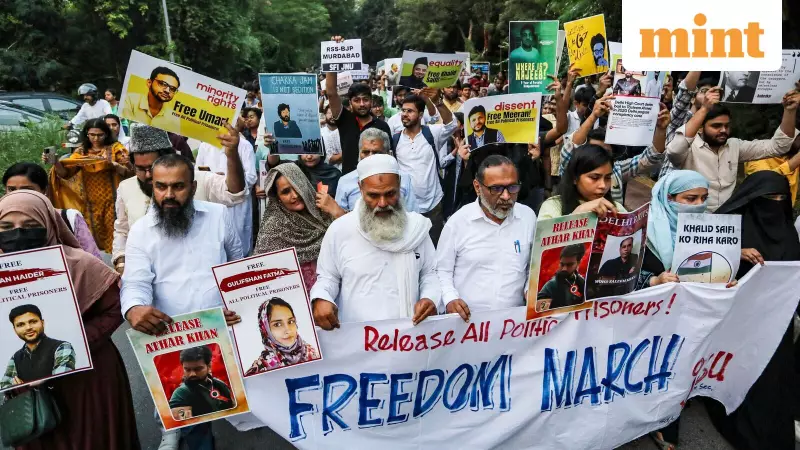
Supreme Court Hears Crucial Bail Pleas in 2020 Delhi Riots Case
The Delhi Police has strongly opposed the bail applications of activists Umar Khalid, Sharjeel Imam, and several others in connection with the February 2020 communal riots in the national capital. Appearing before the Supreme Court on Tuesday, the police described the violence as a meticulously planned assault on the nation's sovereignty, rather than a spontaneous outburst.
The hearing, which took place before a bench of Justices Aravind Kumar and N V Anjaria, remained inconclusive and is scheduled to resume on November 20.
'Orchestrated and Pre-Planned' Violence: Police's Stance
Solicitor General Tushar Mehta, representing the Delhi Police, presented a detailed argument before the court. He asserted that the evidence collected points towards a "well-designed, well-crafted, and well-orchestrated" conspiracy. He explicitly dismissed the notion that the riots were a spontaneous reaction to the protests against the Citizenship (Amendment) Act (CAA) and the National Register of Citizens (NRC).
"First of all, that myth must be busted. This was not a spontaneous riot," Mehta submitted. He emphasized that the intent was to divide society along communal lines, going beyond a mere agitation against a legislative act.
To substantiate the claim of a conspiracy, Mehta referenced a speech allegedly given by accused Sharjeel Imam, in which he reportedly expressed a desire for a 'chakka jaam' (road blockade) in every city with a Muslim population. The Solicitor General also mentioned that a photograph recovered from the accused shows them sitting together, which the prosecution interprets as them "hatching the conspiracy."
Legal Hurdles and Bail Arguments
The accused individuals, including Umar Khalid, Sharjeel Imam, Gulfisha Fatima, Meeran Haider, and Shadab Ahmed, have been charged under the stringent Unlawful Activities (Prevention) Act (UAPA) and other sections of the Indian Penal Code. They are accused of being the "masterminds" behind the riots, which resulted in 53 deaths and over 700 injuries.
Additional Solicitor General S.V. Raju, also appearing for the police, argued against granting bail on the grounds of parity with other accused like Natasha Narwal and Devangana Kalita, who were granted bail in 2021. Raju clarified that the Supreme Court had explicitly stated that those bail orders could not be treated as a precedent.
He stressed that for a UAPA case, bail is exceptionally stringent and can only be granted if the conditions of Section 43D(5) of the act are met. He also contested the Delhi High Court's decision from May 2024 to grant statutory bail to Sharjeel Imam under Section 436-A of the CrPC, arguing that the additional rigours of UAPA supersede such provisions in this context.
Raju further contended that there has been no material change in circumstances in Umar Khalid's case to warrant a fresh look at his bail plea, which has been rejected multiple times before. Khalid, in his defense, has denied all conspiracy charges and claimed there is no evidence linking him directly to any violent acts.
Court's Position and Ongoing Incarceration
The Delhi High Court had previously denied bail to nine accused, including Khalid and Imam, observing that "conspiratorial violence" under the guise of peaceful protest cannot be permitted. The court acknowledged the constitutional right to protest under Article 19(1)(a) but emphasized that this right is not absolute and is subject to reasonable restrictions to maintain law and order.
In a separate ruling on September 2, the bail plea of another accused, Tasleem Ahmed, was also rejected. All the accused have been in jail since 2020, after their bail applications were initially turned down by the trial court. They have consistently denied all allegations leveled against them.
The Delhi Police has expressed its readiness to complete the trial within six months, accusing the defense of employing delaying tactics to build a case for bail. The next hearing in the Supreme Court on November 20 is now pivotal for the future of these cases.





